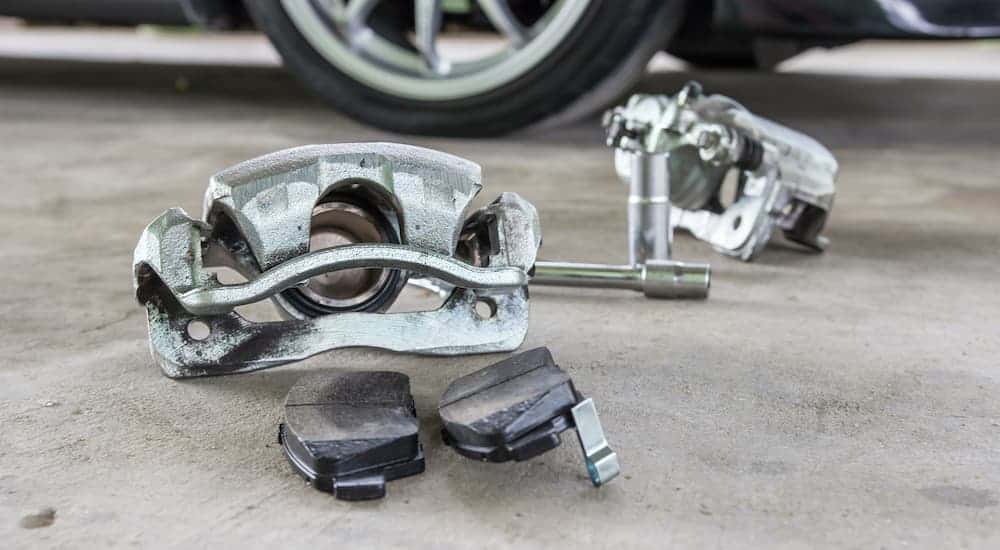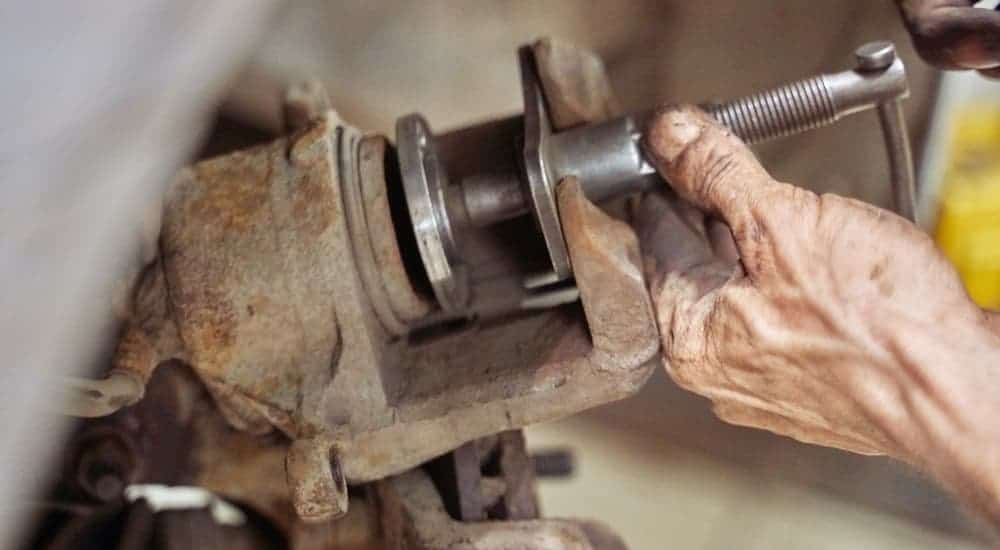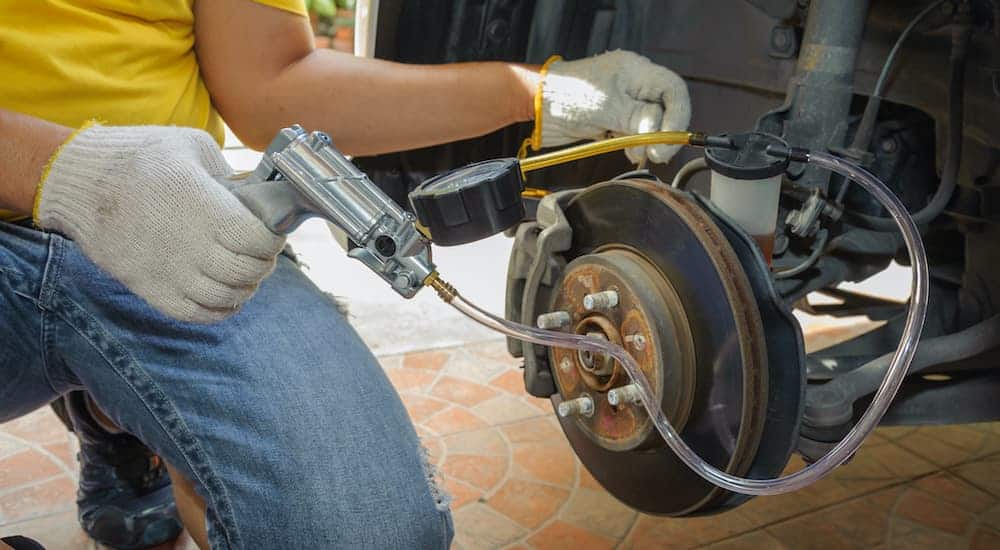Vehicles are unique machines that have changed how humans go about their daily lives for well over a hundred years. With the ability to get anywhere in a fraction of the time that a horse or simply walking can achieve, vehicles are ultimately faster. However, with all of this speed, you’re going to need a reliable way to slow down, and more importantly, come to a complete stop. While modern brakes are more powerful and reliable than ever before, they still need regular brake service to provide maximum performance.
Ideally, you should plan on getting your brakes regularly serviced by a certified mechanic. However, if you’re experiencing troubles with your brakes before you have reached this mileage, you should immediately bring your vehicle to the mechanic to find the problem. Being unable to stop in time is the most dangerous scenario you can encounter on the road, and it is critical that you keep them in perfect working order. While regular visits to Kings Ford Quick Lane will keep your vehicle in proper running condition, here are some brake basics to get you up to speed on what you need to know to determine if it is time to get your brakes serviced.
A Brief History
As you can imagine, brakes are no longer primitive contraptions, thanks to a century of research and development. Modern brakes are complex, and because of this, they’re prone to a variety of different malfunctions. For example, brakes have to provide friction to both the front and rear axles of your vehicle, and not all brakes are created equal. The two brake types you will see are disc and drum brakes, the latter of which was invented in the early 1900s. Manufacturers wouldn’t begin implementing modern disk brakes into their vehicles until at least 50 years later. However, many budget vehicles and large trucks continue to employ drum brakes.
Drum brakes use large “drums” that are cheap to manufacture and can apply significant amounts of braking force. However, they can stop working in wet or icy weather, and they suffer from loss of braking power if you ride the brakes (such as when traveling down mountains). Disc brakes use large metal discs and were originally developed for racing because of their more reliable performance under hard use. Today, nearly all new vehicles come standard with four-wheel disc brakes.
Whether your vehicle has drum brakes or disc brakes, they will be activated by a hydraulic system. Early brakes were activated by cables, but this often resulted in uneven brake force and required considerable physical strength. Hydraulic brakes were designed to distribute an identical amount of pressure to each wheel while multiplying the force applied by the driver. However, if you have a manual emergency brake, then it probably still uses a cable system. But no matter what combination of brake systems your vehicle has, there are some common warning signs to look out for.
What Are The Warning Signs?
Brakes can be tricky and because of this, pinpointing a malfunction isn’t as straightforward as it seems. As every safe driver knows, being vigilant while on the road is a necessity. This not only includes being aware of your surroundings but also paying attention to how your vehicle is performing. Various malfunctions can happen to brakes, and one of the warning signs to pay attention to is a loud squeaking noise when applying pressure. This could mean a few different things, but there’s a high probability that you’ll need new brake pads as the previous ones are no longer viable.
When disc brakes need replacements, it’s usually best to replace both the brake pads and the rotors to get the best performance possible and to avoid potential future abnormalities in your braking. With a drum brake, your braking system will include drum shoes that serve much the same purpose as the brake pads and rotors. Putting off this fix is not ideal, and the minute that you hear an audible squeaking noise when you’re applying the brakes, you should schedule an appointment with us at Kings Ford Quick Lane. Squeaking brakes can be a sign that your pads are about to go, which will result in loss of braking force and possibly damage to your vehicle.
Another sign that your vehicles may require repairs is a grinding feeling when you apply the brakes. This one is more noticeable than other malfunctions as the chances are you’re familiar with how your brakes perform normally. A grinding sound from your brakes is not a good sign, so be sure to schedule a servicing job to fix the problem. Brake grinding is a degenerative malfunction, and the longer it occurs, the worse it will get. There are many different reasons as to why your brakes are emitting an audible grinding sound or a grinding sensation at your feet. A vast majority of the time, the brakes begin grinding simply because of wear and tear. This is another reason why regularly inspecting your brakes is not only a smart idea but a safe one as well.
Vehicles today are equipped with ways to notify you if something is malfunctioning. There’s the check engine light, oil change light, and vehicles even include hydraulic brake light indicators to identify problems. You’ll usually find this light situated right near the parking brake light on your dashboard. Some higher-end vehicles these days go above and beyond by situating a sensor inside each of your brake pads. These sensors are designed to alert you when your brake pads have been worn down enough to require your attention. If any brake warning lights appear on your dash, it is time to get your car looked at.
In addition to the above warning signs, your vehicle’s owner’s manual will likely provide information on how often you should have your brakes inspected or repaired. Following those guidelines should prevent you from ever experiencing any brake issues. A vehicle’s ability to brake can make all the difference when in regards to safety, and even if you suspect you have a brake issue, you should get it checked out. As vehicles continue to grow more capable, more efficient, and even smarter, brakes have been getting updates much the same. Stopping a vehicle in motion is as important as moving is for a vehicle. When your vehicle requires repairs, you should come to visit us for a quick and hassle-free process.
Getting Your Brakes Fixed With Us
We’re Kings Quick Lane, and our service center is open to you whenever you require repairs. These repairs include brake servicing that our certified mechanics perform promptly, and we can make your brakes as good as new. But we can service far more than just your brakes – no matter what work you need done on your car, we can handle it. Whether you’re coming in for a routine oil or tire change, getting your brakes replaced, or any of our other available services, we’re looking forward to assisting you. If your vehicle requires attention, you may schedule an appointment with us either over the phone or directly through our website. Our rates are competitive, and our service is unmatched, so come on down to our Cincinnati shop and get your car ready to go.



